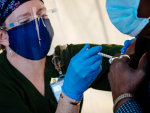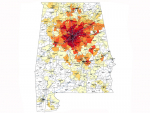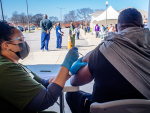Displaying items by tag: department of medicine
Scarinci’s Cervical Cancer Elimination project aims to eliminate cervical cancer as a public health problem in Sri Lanka.
Tagged under
Differences in DNA methylation correlated with differences in heart-failure outcomes, as measured by two-year mortality.
Tagged under
Using spatial transcriptomics, UAB researchers set out to understand the differences and similarities between two viral infections causing acute lung injury, as it could improve patient care, as well as identify novel therapeutic targets.
Tagged under
The new guidelines regarding antibiotic use for several common infections should help reduce antibiotic resistance and overuse.
Tagged under
A study conducted by UAB investigators found that the newly recommended scores are very effective in diagnosing a type of heart failure that is challenging to detect, and can also help predict patients’ long-term outcomes.
Spring is always a time of hope, and experts from the UAB School of Medicine offer suggestions on how to improve your mental wellbeing.
Tagged under
This study will aid the understanding of, and future research on, inflammatory bowel disease, which afflicts about 1.6 million Americans.
Tagged under
Children who can read on grade level by the end of third grade are 13 times more likely to graduate from high school than those who cannot.
Tagged under
Many patients have been struggling to pay for their treatment, and the financial consequences can affect a person’s emotional well-being. This collaborative effort will recruit researchers nationwide to help solve these issues.
Tagged under
In a study of more than 6,000 American adults, UAB investigators found that those with a coronary artery calcium score greater than zero have a higher risk of cardiac events. CAC may help guide blood pressure control and comprehensive cardiovascular care.
Professor emeritus Bob Centor has been honored for excellence in teaching in the field of medical education.
UAB researchers examined the lack of representation of women and racial/ethnic minorities in higher levels of academic medicine and created several initiatives to ensure that, moving forward, UAB is part of the solution.
Researchers find a role for citrullinated vimentin as a damage-associated molecular pattern molecule, or DAMP, that is generated by lung macrophages in response to environmental cadmium/carbon black.
Tagged under
UAB vaccine demographic numbers holding steady as Center Point vaccination site preps for Friday, March 19, opening.
Tagged under
Alabama and the Southeast have high rates of kidney disease, especially in minority populations. On World Kidney Day, physicians have a chance to shine a light on this troublesome disease.
The list was made by a group that aspires to bolster and increase diversity across all scientific fields, promote retention through the “leaky academic pipeline,” and broaden academic and industrial awareness of diversity and inclusion.
Tagged under
- release
- neuroscience
- school of medicine
- school of public health
- college of arts and sciences
- department of chemistry
- department of neurology
- department of medicine
- department of epidemiology
- department of psychology
- department of microbiology
- department of neurobiology
- department of physics
- division of endocrinology diabetes and metabolism
- division of hematology and oncology
- comprehensive neuroscience center
- oneal comprehensive cancer center
UAB experts explain why women should not have concerns about the COVID-19 vaccine’s impacting their fertility goals.
Tagged under
To date, 33 percent of vaccine doses administered by UAB have gone to underrepresented communities, with almost 21 percent to Black Alabamians.
Tagged under
UAB will now operate three community vaccination sites — two downtown and one in Hoover — in an effort to distribute the COVID-19 vaccine to more people.
Tagged under
Research found that gaining community members’ perspectives to identify barriers and facilitators to COVID-19, related to prevention, coping and testing, may potentially improve outcomes.
Tagged under



















